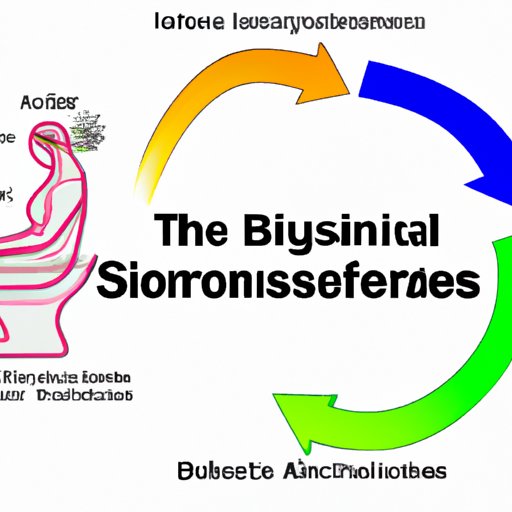
Introduction
Have you ever noticed that when you’re stressed, your stomach seems to experience the consequences? For individuals with Irritable Bowel Syndrome (IBS), this correlation between stress and symptoms can be especially strong. In fact, research has shown that there is a complex relationship between stress and IBS symptoms. This article will explore how stress can trigger IBS flare-ups and discuss stress management techniques that may help alleviate symptoms.
The Gut-Brain Connection: How Stress Triggers IBS Flare-Ups
The gut-brain axis is the scientific name for the connection between the digestive system and the central nervous system. This connection means that stress can have a direct effect on digestion. When the body is under stress, the nervous system signals the release of hormones such as cortisol and adrenaline, which can have negative effects on digestive processes. Stress can trigger IBS symptoms not only by making the gut more sensitive, but also by causing spasms and changes in the speed of digestion. Common stressors such as work, relationships or trauma can lead to these symptoms.
The Physiological Links Between Chronic Stress and IBS
The body’s stress response system is designed to help us cope with short-term stress. However, chronic stress can cause this system to become dysregulated, leading to negative consequences such as inflammation in the gut, increased gut permeability, and changes in the gut microbiome. With repeated activation, these physiological changes can contribute to the development of IBS symptoms. Research has linked chronic stress to increased abdominal pain, bowel movement frequency, and more severe IBS symptoms in general. It’s important to note that these changes happen over time and may not be immediately evident.
Understanding the Role of Stress in Irritable Bowel Syndrome
IBS is a chronic condition that affects the large intestine and causes symptoms such as abdominal pain, bloating, and changes in bowel movements. While the exact causes of IBS are unknown, stress has been recognized as a major contributor. Stress can contribute to IBS symptoms through several mechanisms, including changes in gut motility, sensitivity to pain, and the immune response to inflammation in the gut. Many people with IBS report experiencing worsening symptoms during periods of high stress or anxiety. For some, stress may even be the primary trigger for their IBS symptoms.
From Anxiety to Abdominal Pain: Unraveling the Complex Relationship between Stress and IBS
Anxiety is known to be intimately linked to IBS. Anxiety can trigger stress, which in turn, can lead to IBS symptoms. However, not all stressors are created equal. For example, emotional stress may be more likely to trigger IBS symptoms than physical stress. Additionally, other factors such as diet, sleep quality, and medications may also contribute to IBS symptoms or interact with stress to make symptoms worse. It’s important to take a holistic approach to managing IBS, and address all contributing factors as part of a comprehensive treatment plan.
The Connection Between the Mind and Gut: Can Stress Really Cause IBS?
The link between stress and IBS symptoms is well-established, but it can be difficult to know for sure whether stress is causing IBS or vice versa. However, there is strong evidence that stress can contribute to the development and exacerbation of IBS symptoms. This is because stress can affect the gut in multiple ways, including by increasing inflammation, altering microbial communities, and causing changes in gut motility. While more research is needed to fully understand this complex relationship, there is growing recognition that stress reduction techniques can be an effective way to manage IBS symptoms.
Managing Stress to Reduce the Symptoms of IBS: Tips and Techniques
There are many different techniques that can help manage stress and reduce the symptoms of IBS. Some of these techniques include meditation, deep breathing exercises, cognitive-behavioral therapy, and biofeedback. Mindfulness practices, such as yoga and tai chi, have also been shown to be helpful. Additionally, making lifestyle changes such as ensuring adequate sleep and exercise, and eating a healthy, balanced diet can also help reduce stress and improve IBS symptoms. It’s important to consult with a healthcare provider to determine which techniques may be most appropriate for you.
Conclusion
Stress is a major contributor to IBS symptoms and can have negative effects on gut health. However, there are a variety of different techniques that can help manage stress and alleviate symptoms. By taking a holistic approach to managing IBS, which includes reducing stress and addressing lifestyle factors, it is possible to reduce the severity and frequency of IBS symptoms. Reach out to your healthcare provider to learn more about specific ways to manage stress and IBS together.





